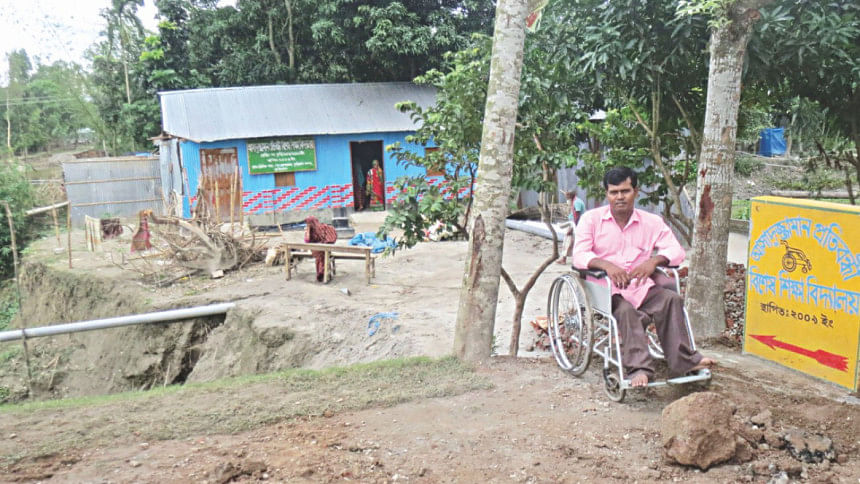No obstacle too great

When Asaduzzaman, now 27, from North Nagrajpur village in Bhangamor union of Kurigram's Nageshwari upazila, was eager to attend school as a child, his father wouldn't let him. The family could see no point in educating a child afflicted with polio at the age of two, who had lost the use of his legs. Few could have guessed that the determined lad would not only complete his education but go on to found a school for children with disabilities.
“My parents didn't treat me like my brothers,” says Asad, the sixth son of an economically struggling family. “They used to wonder what I could contribute.”
There came a day in 1994 when a young Asad decided to prove his family wrong. He reached school of his own accord for the first time, dragging himself along the roadside.
His struggle didn't end there. “The Class I students at Bhangamor Government Primary School couldn't accept me as their classmate,” he recalls. “I took lessons on the floor in the corridor outside. It was two months before I was allowed inside the classroom.”
Asad knows the barriers of prejudice. He knows how to overcome them.
He passed class five on a talent-pool scholarship. He completed his Secondary School Certificate from Kharibari High School and graduated with a college-level diploma in computer science. For most of these years, working as a tutor Asad covered his own expenses.
In 2006 Asad established the Disabled Welfare Association in Bhogdanga union in Kurigram Sadar upazila where he currently serves as director. “I motivated friends to undertake a union-wide survey of people living with disabilities. There were around six hundred,” he says. “We collected money to found a school for students with disabilities. At first we bought five decimals as its grounds.”
Asaduzzaman Special School for the Disabled opened its doors in 2009, relying on four volunteer teachers. It had eighty students, all with disabilities. “A local lawmaker then helped with a relief donation,” says Asad, “We bought five decimals of adjoining land. Later, a local, Sadeque Ali, gave another ten decimals. We extended the school building.”
Asad's school now has 196 students, fifty of whom have no disability. Ten teachers work there. “The teachers recently donated a van to help students with transport,” says Asad. “They've appointed three van-cyclists.”
No disability can exclude a child from enrolment: cerebral palsy, delayed-growth, visual impairment, mental and intellectual disabilities, multi-disabilities, speech and hearing impairment, Down syndrome or dwarfism: Asad's school caters to all.
“My son has gradually improved since he was admitted,” says Shahida Begum, 36, mother to autistic Shahin Alom, 17. “He likes school. Earlier he couldn't understand anything clearly. Now he understands, though he cannot speak.”
Ferdousi Begum is similarly pleased with the progress of her daughter Farjan Akhtar, 11, who has cerebral palsy. “I tried to enrol her in a government primary but failed,” she says. “After five years at this school she is progressing. She couldn't visually identify various common items but now, at least sometimes, she can.”
“We try our best,” says current headmaster Badol Hossain, “but we aren't properly trained. Five of our teachers have completed short-term disability education training. We're also trying to have the school registered with the social welfare ministry. It's important because for the first time, nine students are registered for the Primary School Certificate exams.”
Unfortunately, since last August the school has had to contend with a new problem. Floods washed away most of the school's land. “Only two rooms including the teacher's common room and some furniture were saved,” says Asad. “We haven't been able to recommence classes yet but we are trying to build a new tin building.”
It's not a situation that favours the Primary School Certificate candidates, with exams in late November. But as with every other obstacle Asad has faced, it's likely that in the longer term, the school shall find a way to overcome.
“I know too well the hardship people with disabilities face,” says Asad. “I want that they can live full and normal lives with equal rights and opportunities.” Asad's school is helping them do just that.

 For all latest news, follow The Daily Star's Google News channel.
For all latest news, follow The Daily Star's Google News channel. 



Comments